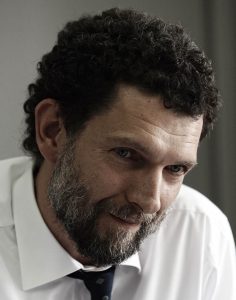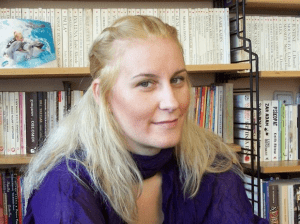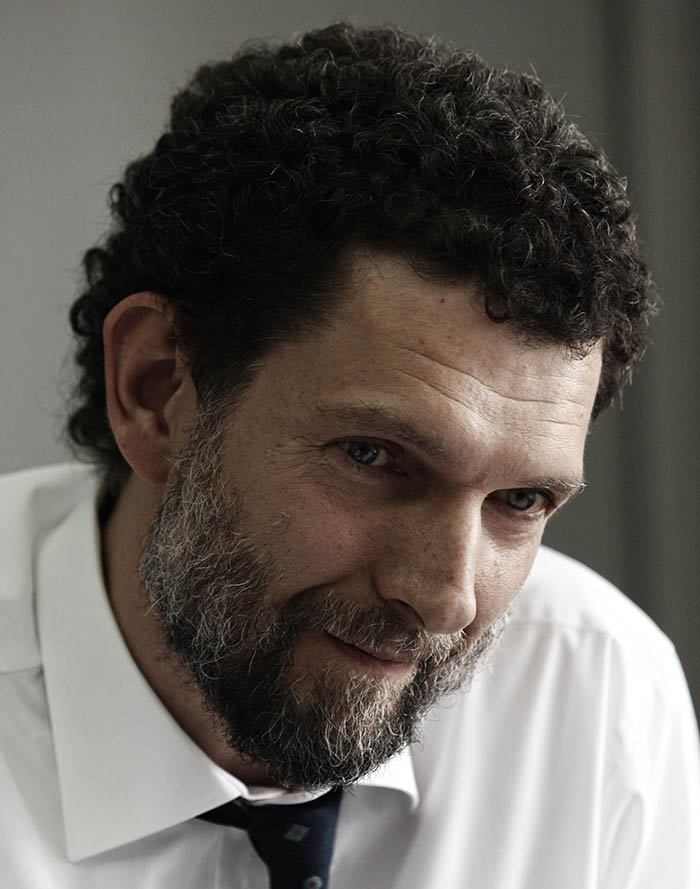Index relies entirely on the support of donors and readers to do its work.
Help us keep amplifying censored voices today.
[vc_row][vc_column][vc_column_text]

Osman Kavala. Credit: Anadolu Kültür
We, the undersigned human rights and freedom of expression organisations, condemn the interim judicial decision taken in the second hearing of the Gezi Park trial. The indictment accuses 16 civil society figures and arts practitioners in Turkey of having planned to “attempt to overthrow the government” and of having financed the peaceful Gezi Park protests. If found guilty, they face a sentence of life imprisonment without parole.
We share the view that “the trial is in itself an act of intimidation”, having been opened 6 years after the Gezi protests took place in 2013. We are extremely concerned that this trial may once again contribute to creating a chilling effect on the fulfillment of the rights to freedom of assembly and expression and the legitimate right to protest as enshrined in the Turkish Constitution. We call for a concerted response by the European Union and Europe Member States to put urgent, consistent and collective pressure upon the Government of Turkey to restore the rule of law and the independence of the judiciary in Turkey.
On 18 July 2019, the judicial panel decided to reject the requests of defence lawyers for the release of Osman Kavala from 21 months of pre-trial detention and for the lifting of judicial control measures, including the travel ban, on the other defendants. Sarah Clarke, ARTICLE 19’s Head of Europe and Central Asia, said: “This decision represents a disturbingly clear example of the continuous absence of the rule of law and lack of independence of the judiciary in Turkey.” The indictment itself shows the total lack of tangible evidence for these allegations.
We strongly object the continuing pre-trial detention of Osman Kavala, who has now been in a maximum-security prison for 631 days. Kavala said in his defence statement, “I was never asked to make any statements during my time in detention or in custody with the police in relation to the allegations against me. I was not questioned by the prosecutor at any time after I was arrested. The indictment was prepared 16 months after I was arrested and this too indicates that there was no evidence to hand.”
Grounds for Kavala’s arrest are insufficiently supported in the indictment, raising serious concerns relating to the proportionality and legitimacy of his arrest. The lengthy pre-trial detention, which started 4 years after the Gezi Park protests took place, is unwarranted and disproportionate as a legal precaution against the defendant’s absconding or posing a ‘threat to society’. The excessive length of Kavala’s pre-trial detention of 21 months, his rights to presumption of innocence, to humane treatment, to the right to a fair trial and to liberty and security have all been violated in the most unnacceptable manner.

The 16 individuals named in the ruling are: Osman Kavala, Meltem Arikan (pictured), Memet Ali Alabora, Pinar Ogun, Can Dündar, Mücella Yapıcı, Tayfun Kahraman, Hakan Altınay, Gökçe Yılmaz, Can Atalay, Çiğdem Mater Utku, Hanzade Hikmet Germiyanoğlu, İnanç Ekmekçi, Mine Özerden, Yiğit Aksakoğlu, Yiğit Ali Ekmekçi. (Photo: Wikipedia)
During the second hearing, defence lawyers argued that the evidence collected between May and November 2013 in relation to the Gezi protests was “re-evaluated”. In an earlier case drawing on some of the same evidence, an Istanbul court in 2015 acquitted all 26 defendants (including two of the defendants in the current Gezi Park case, (Mücella Yapıcı and Tayfun Kahraman). In the current case, the court has failed to take into consideration that 2015 judgement.
Furthermore, the defence demonstrated the inappropriateness of the charges under Article 312 of the Turkish Criminal Code which clearly includes the reference to an “act of force or violence” in the definition of the offence. The 2013 Gezi Park protests represented a peaceful and non-violent movement. The actual excessive use of force was that used by the police against civilians including the extensive use of teargas against the crowds. The indictment, as the defence lawyers proved time and again, contains no reference to an armed organisation (as per Article 314 of the Turkish Criminal Code), which further questions the basis of the accusations.
Norwegian PEN President, Kjersti Løken Stavrum said, “We will continue to monitor this trial and to advocate for all charges to be dropped against the 16 defendants. The fact that the 657-page indictment, bereft of concrete evidence, was accepted by the judicial panel is sadly, once more a clear indication of the poor state of the rule of law in Turkey.”
The next hearing of the Gezi Park trial will take place in Silivri on 8-9 October 2019, when other defendants will be heard and plaintiffs’ requests will be evaluated by the court.
ARTICLE 19
Articolo 21
Danish PEN
ECPMF (European Centre for Press and Media Freedom)
English PEN
Front Line Defenders
Index on Censorship
Norwegian PEN
OBC Transeuropa
PEN America
PEN Flanders
PEN International
PEN Netherlands
PEN Suisse Romand
PEN Turkey
RSF (Reporters Without Borders)
SEEMO (South East Europe Media Organisation)
Swedish PEN
Swiss Italian and Reto-Romanch PEN Centre
Wales PEN Cymru[/vc_column_text][vc_basic_grid post_type=”post” max_items=”4″ element_width=”6″ grid_id=”vc_gid:1563959006215-1e666f90-a594-0″ taxonomies=”55″][/vc_column][/vc_row]
[vc_row][vc_column][vc_column_text]
“This farcical indictment shows how far Turkey’s government is willing to go to silence dissent and should show the world how much freedom of expression has degraded for all of the country’s citizens,” said Jodie Ginsberg, CEO of Index on Censorship.
The criminal court has 15 days to examine the indictment charging the 16 with attempting to overthrow the government for their part in the 2013 Gezi protests, the biggest anti-government demonstrations since President Recep Tayyip Erdoğan’s Islamist government came to power in 2002. Almost six years after the protests during which tens of thousands people across Turkey took the streets, the 16 named in the indictment now faced a possible lifetime behind bars without the possibility of parole, according to a report in Ahval.
Arikan was nominated for a 2014 Index on Censorship Freedom of Expression Award in the arts category.
The other 12 individuals named in the indictment are: Osman Kavala, Mücella Yapıcı, Tayfun Kahraman, Hakan Altınay, Gökçe Yılmaz, Can Atalay, Çiğdem Mater Utku, Hanzade Hikmet Germiyanoğlu, İnanç Ekmekçi, Mine Özerden, Yiğit Aksakoğlu, Yiğit Ali Ekmekçi.[/vc_column_text][vc_basic_grid post_type=”post” max_items=”4″ element_width=”6″ grid_id=”vc_gid:1550765322731-f7944837-909a-0″ taxonomies=”55″][/vc_column][/vc_row]
[vc_row][vc_column][vc_column_text]

Osman Kavala. Credit: Anadolu Kültür
We, the undersigned representatives of Time to Talk debate centres from across Europe, were shocked to learn about the detention of Osman Kavala, the chairperson of Anadolu Kültür and the founder of our fellow Time to Talk member, DEPO Istanbul.
Osman Kavala is a key figure within Turkish culture and civil society, a committed European and democrat and a central figure who inspires and enables cultural exchange throughout Turkey and with other European countries. Collaborating with some of the important cultural organisations that he has founded in Turkey, we have witnessed the power of his commitment to democracy, pluralism, freedom of speech, peace and human rights as well as his devotion to intercultural dialogue, cultural heritage and the arts.
On the 18th October 2017, Osman Kavala was detained. On November 1st, after 14 days in custody, he was charged with having ties to terrorist organisations and with attempting to overthrow the constitutional order in Turkey. According to Turkish media reports, he is accused of being the “leader and organiser” of the Gezi protests as well as of having had contact with a U.S.-based expert on Turkey, who the Turkish state appears to believe to have been amongst those behind plotting the coup attempt of summer 2016.
Such accusations are entirely absurd and grotesque. We urge European media and politicians to follow the Osman Kavala case closely and to request full transparency in its processing. We insist on and hope to see a prompt release of Osman Kavala by the Turkish authorities – for the sake of Turkey and its people.
Dessy Gavrilova, Founder and Executive Chair
European Network of Houses for Debate, Time to Talk, Vienna
Marta Šimečkova, Director
Central European Forum, Bratislava
Judit Carrera, Head of Debates Programme
Elisabet Gaula, Debates Coordinator
Centre for Contemporary Culture (CCCB), Barcelona
Borka Pavićević, Director
Centre for Cultural Decontamination, Belgrade
Yoeri Albrecht, Director
De Balie, Amsterdam
Sabine Beppler- Spahl, Chair of the Board
Freiblickinstitut e. V., Berlin
Rachael Jolley, Editor
Index on Censorship, London
Claire Fox, Director
Institute of Ideas, London
The team
Krytyka Polityczna, Warsaw
The team
Kultura Liberalna, Warsaw
Kristina Hristova, Executive Director
The Red House Centre for Culture and Debate, Sofia
Sergey Lukashevsky, Director
Sakharov Centre, Moscow
and Member
Moscow Helsinki Group, Moscow
Vasyl Cherepanyn, Head
Visual Culture Research Centre, Kyiv[/vc_column_text][/vc_column][/vc_row][vc_row][vc_column][vc_basic_grid post_type=”post” max_items=”4″ element_width=”6″ grid_id=”vc_gid:1510242474854-81957f7a-c6c6-5″ taxonomies=”55″][/vc_column][/vc_row]
[vc_row][vc_column][vc_column_text]

Osman Kavala. Credit: Anadolu Kültür
On 19 October, when police officers detained Osman Kavala, a left-wing Turkish human rights activist and businessman who funds a variety of cultural and civil society activities, I was set to catch a plane en route to Armenia to attend a conference. The news was extremely bothersome as I, having held a civil society job for two years, knew all too well what his detention entailed. As Andrew Finkel, an executive of the Independent Platform for Journalism (P24) commented, his detention and later arrest was “a chilling signal to those working in the civil society community”.
I never knew Kavala personally, but always respected him for allowing civil society organisations to use his centrally-located Cezayir Restaurant for events and gatherings, usually at a minimal charge. I tried not to think about what I understood to be a new low in Turkey’s recent descent into authoritarianism and had managed to completely forget about it by the time I had reached the beautiful mountain resort of Arghevan. Yet my fellow conference attendees were quick to remind me of what had happened at home earlier in the day. Several people greeted me saying they had heard the news; that they were extremely concerned about their friend Osman. “He has more friends in Armenia than he has in Turkey,” Armen Ohanyan, an Armenian writer, told me.
This, of course, owes to Kavala’s commitment to Turkish-Armenian reconciliation. He has been committed to improving the troubled relations between the two neighbours stemming from a number of factors, but mainly from Turkey’s unwillingness to recognise the Armenian Genocide. However, repairing ties was not the only area where Kavala worked. Anadolu Kültür, a foundation he established, has carried out many cultural projects including restoration of minority heritage. He has also been an active supporter of children’s, women’s and LGBT rights. The foundation was recently involved in a project for integrating Syrian refugees into Turkish society.
Dozens of articles from his friends followed his arrest and from them we learn that, unlike most of Turkey’s elite, this wealthy businessman not only talked about the most problematic affairs of his country but actively put time and effort into resolving them. He remained committed to pursuing that goal until it was too much for the government. Perhaps he was not a saint or some modern-day sage who devoted his life to others, but he was a good man; a “good citizen” as the son-in-law of a general, who was imprisoned in a past crackdown led by prosecutors who were part of the Fethullah Gülen network which today the Turkish government accuses of being behind the 2016 coup attempt, called him.
Ironically, Kavala was arrested two weeks after his detention by an Istanbul court on the basis of a prosecutor’s allegation that he was linked with the “parallel structure” FETÖ/PDY — or the Fethullahist Terrorist Organisation — the name Turkish authorities give to Gülen network.
The prosecution accuses Kavala of “attempting to overthrow the government” by supporting Turkey’s Gezi Park protests — massive peaceful anti-government demonstrations that took place in all provinces across the country four years ago. His arrest was not a surprise and president Erdogan called Kavala an “agent” and the “Soros of Turkey” in the few hours following his initial detention.
In a statement he made while in prison on 6 November 2017, Kavala said it was Erdogan’s statements that led to his arrest. “My arrest is part of the government’s attack on all opposition,” he told a visiting deputy.
The charges against him are bogus, as Sedat Ergin, the former editor-in-chief of the Hürriyet daily, explained at length in a column which was translated into English. On 9 November, prominent European diplomats and politicians, including Carl Bildt, Claus Offe and others, wrote to the Financial Times, of the ridiculousness of the charges against him.
Whether there will be an unexpected yet helpful twist in the course of his proceedings as was the case of the eight human rights defenders who were released conditionally have yet to be seen. However, his treatment so far clearly shows that darker times are ahead for civil society.
On 8 November the Checks and Balances Network (DDA), an umbrella network for more than 100 civil society organisations, made a timid statement denouncing reports labeling it as a supporter of foreign agents, following news stories in the pro-government media which stated that the National Endowment for Democracy (NED) funded network is an arm of the CIA. Other civil society organisations that are involved in non-political activities are also extremely concerned.
What makes Kavala’s arrest so pervasive is that it sends the message that the government has not been satisfied by the level of the crackdown it has already imposed on civil society. A total of 1,125 associations and 41 foundations were shut down under cabinet decrees since the declaration of the post-coup attempt state of emergency. Civil society leaders, who might have spoken out on Kavala’s arrest or not, now understand that Erdoğan may resort to Putin-like measures, banning civil society activities entirely and labelling its representatives as “foreign agents”.
That fear echoed in the initial remarks of Kavala’s academic and activist wife Ayşe Buğra, who said in a statement she made after her husband’s arrest: ““With the arrest ruling we have not only lost Osman Kavala’s freedom but at the same time our hopes in democracy, peace and the rule of law.”[/vc_column_text][/vc_column][/vc_row][vc_row][vc_column][vc_basic_grid post_type=”post” max_items=”4″ element_width=”6″ grid_id=”vc_gid:1510241893657-0016a8b6-b819-2″ taxonomies=”7355″][/vc_column][/vc_row]